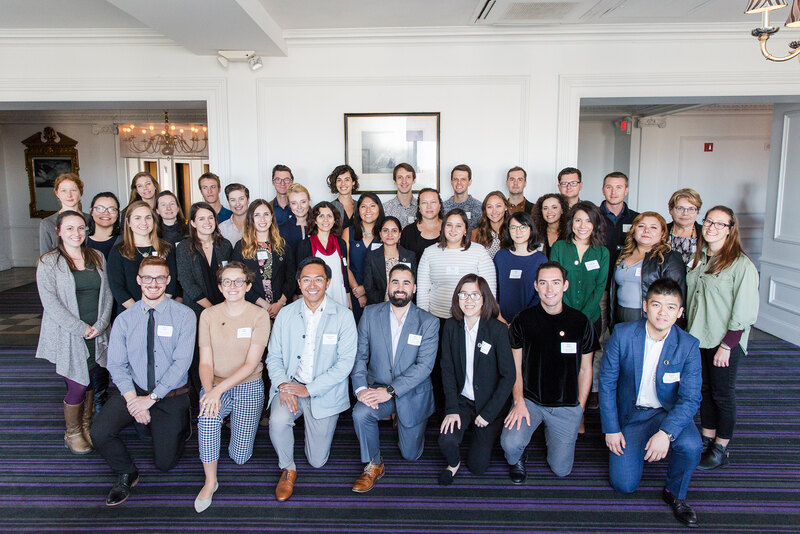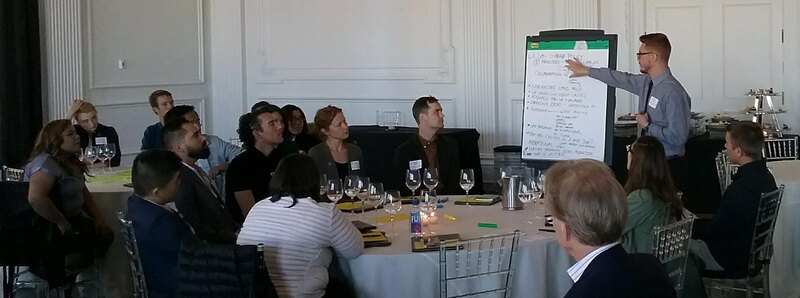What Does the Next Generation Want? Insights from the 2018 LAF Olmsted Scholars

On October 18, 35 of LAF’s 2018 Olmsted Scholars gathered in Philadelphia for a recognition luncheon and leadership conversation to celebrate their achievements and discuss the vision they have for themselves and the profession. LAF Olmsted Scholars are landscape architecture students nominated by their colleges and universities for their exceptional leadership potential. These emerging professionals shared their concerns and aspirations, which congealed around five key themes. Established landscape architects should take note.
Work-life balance
Across the board, the Olmsted Scholars had concerns about work-life balance. As a whole, the group worried about what work schedules would look like and what impact that would have on their personal relationships and aspirations. Their hopes and anxieties are shared by many new graduates.
One father worried that he would be forced to choose between his career and his family at some point, and that his career would suffer because of this choice. It was particularly stirring to see family and child-rearing concerns being raised by the young men in the group. For a long time, family leave has been considered a women’s issue, yet it is not. Parents and families are made up of people of all genders, and they are looking to their workplaces to support them in not only their professional roles, but also the personal roles that enrich their professional practice.
Active mentorship
The 2018 Olmsted Scholars were excited about mentorship. They want to continue learning, asking questions, and expanding their knowledge and experience. There were many ideas of what mentorship might look like. One Scholar put forth an impactful paradigm of the mentorship she hoped to find: it was not be a single relationship but a culture that permeated the workplace. In this culture, everyone would mentor and be mentored; everyone would understand that learning is an iterative process that all parties need to take part in.
Another Scholar further highlighted there should be no place for shame in mentorship. She hoped for a relationship in which she felt comfortable asking any question, no matter how “dumb,” and in which she would be greeted with honest, empathetic feedback.

Empowering women, immigrants, and people of color
The Scholars’ discussion echoed and amplified reinvigorated LAF’s discussions of diversity, equity, and inclusion in the workplace and in design. They reiterated the belief that people should be valued for their ideas and contributions, not their gender, immigration status, or the color of their skin. The Olmsted Scholars sought action to support not only working parents but their international peers and the communities that landscape architects serve that are often unrepresented on design teams. While they understood that there are structural problems at play, they recognized that everyone has the ability to create change through actions that fit their capacity.
Values-based practice models
The 2018 Olmsted Scholars were excited to put the theories and skills they’ve learned in school into practice! They hoped that their work will go beyond the standard scope of landscape architecture practice to address issues and work with communities that may not have access to the profession and for whom a landscape perspective is critical for creating holistic solutions. The Scholars discussed support for research and for marginalized communities as an opportunity to reach beyond practice and shape the knowledge and opportunity that will affect landscape architects and their clients and stakeholders for years to come. Whether pursuing research interests or pro bono/grant-funded project work, the Scholars saw these passions as a spark that will carry the profession into the future.
Advocacy beyond the profession
This class of Olmsted Scholars knows that opportunities to influence the built environment do not start or end at the boundaries of landscape architecture or the allied professions. They want to see landscape architects making the case to elected officials, agency heads, community leaders, and the public. Government leaders and staff are the implementers of public works, and community input can make or break a project. The Scholars identified these key stakeholders as needing to understand the value landscape contributes. Through targeted advocacy, they saw the potential for new champions of landscape architecture and landscape performance.
The 2018 LAF Olmsted Scholars are the leaders of tomorrow, but this discussion demonstrates they’re already thinking big today.











